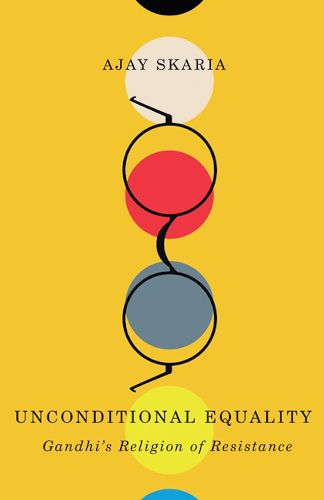Readings Newsletter
Become a Readings Member to make your shopping experience even easier.
Sign in or sign up for free!
You’re not far away from qualifying for FREE standard shipping within Australia
You’ve qualified for FREE standard shipping within Australia
The cart is loading…






Unconditional Equality examines Mahatma Gandhi s critique of liberal ideas of freedom and equality and his own practice of a freedom and equality organized around religion. It reconceives satyagraha (passive resistance) as a politics that strives for the absolute equality of all beings. Liberal traditions usually affirm an abstract equality centered on some form of autonomy, the Kantian term for the everyday sovereignty that rational beings exercise by granting themselves universal law. But for Gandhi, such equality is an equality of sword profoundly violent not only because it excludes those presumed to lack reason (such as animals or the colonized) but also because those included lose the power to love (which requires the surrender of autonomy or, more broadly, sovereignty).Gandhi professes instead a politics organized around dharma, or religion. For him, there can be no politics without religion. This religion involves self-surrender, a freely offered surrender of autonomy and everyday sovereignty. For Gandhi, the religion that stays in all religions is satyagraha the agraha (insistence) on or of satya (being or truth).Ajay Skaria argues that, conceptually, satyagraha insists on equality without exception of all humans, animals, and things. This cannot be understood in terms of sovereignty: it must be an equality of the minor.
$9.00 standard shipping within Australia
FREE standard shipping within Australia for orders over $100.00
Express & International shipping calculated at checkout
Unconditional Equality examines Mahatma Gandhi s critique of liberal ideas of freedom and equality and his own practice of a freedom and equality organized around religion. It reconceives satyagraha (passive resistance) as a politics that strives for the absolute equality of all beings. Liberal traditions usually affirm an abstract equality centered on some form of autonomy, the Kantian term for the everyday sovereignty that rational beings exercise by granting themselves universal law. But for Gandhi, such equality is an equality of sword profoundly violent not only because it excludes those presumed to lack reason (such as animals or the colonized) but also because those included lose the power to love (which requires the surrender of autonomy or, more broadly, sovereignty).Gandhi professes instead a politics organized around dharma, or religion. For him, there can be no politics without religion. This religion involves self-surrender, a freely offered surrender of autonomy and everyday sovereignty. For Gandhi, the religion that stays in all religions is satyagraha the agraha (insistence) on or of satya (being or truth).Ajay Skaria argues that, conceptually, satyagraha insists on equality without exception of all humans, animals, and things. This cannot be understood in terms of sovereignty: it must be an equality of the minor.